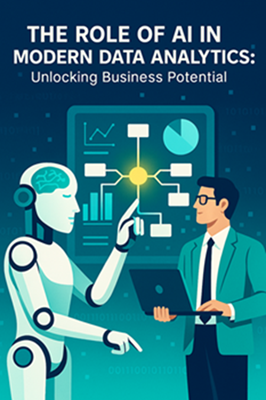In today’s data-driven economy, organizations face an overwhelming flow of information from customer interactions and market dynamics to operational metrics and social media activity. The real challenge lies not in gathering this data, but in interpreting it quickly enough to fuel timely, impactful decisions. This is where Artificial Intelligence (AI) transforms the landscape revolutionizing data analytics and redefining how businesses operate, compete, and grow.
🤖How AI Transforms Data Analytics
AI enhances data analytics by automating complex processes, uncovering hidden patterns, and delivering predictive insights with unprecedented speed and accuracy. Traditional analytics often rely on manual interpretation and static models, which can be slow and limited in scope. AI, on the other hand, leverages machine learning, deep learning, and natural language processing to:
- Process massive datasets in real time
- Identify trends and anomalies invisible to human analysts
- Predict future outcomes based on historical data
- Recommend optimal actions through prescriptive analytics
This shift from descriptive to predictive and prescriptive analytics empowers businesses to move from reactive decision-making to proactive strategy.
💼Business Benefits of AI-Driven Analytics
Here’s how AI-powered data analytics is helping businesses thrive:
- Smarter Decision-Making AI enables executives and managers to make data-backed decisions faster. Whether it's forecasting demand, optimizing pricing, or identifying customer churn, AI provides actionable insights that reduce guesswork.
- Enhanced Customer Experience By analyzing customer behavior and preferences, AI helps personalize interactions, recommend products, and tailor marketing campaigns leading to higher engagement and loyalty.
- Operational Efficiency AI automates routine tasks like data cleaning, reporting, and anomaly detection. This frees up human analysts to focus on strategic initiatives and reduces operational costs.
- Risk Management AI can detect fraud, monitor compliance, and assess financial risks by analyzing patterns across diverse datasets. This proactive approach helps mitigate threats before they escalate.
- Agility and Innovation With AI, businesses can quickly adapt to market changes, test new ideas, and innovate faster. Real-time analytics supports agile decision-making in dynamic environments.
🌐Real-World Applications
Industries across the board are embracing AI in analytics:
- Retail: Personalized shopping experiences and inventory optimization
- Healthcare: Predictive diagnostics and patient outcome forecasting
- Finance: Fraud detection and algorithmic trading
- Manufacturing: Predictive maintenance and supply chain optimization
- Marketing: Sentiment analysis and campaign performance tracking
⚠️Challanges to Consider
Despite its promise, AI in analytics comes with challenges:
- Data quality and governance: AI models need clean, reliable data to perform well.
- Talent gap: Skilled professionals who understand both AI and business context are in high demand.
- Ethical concerns: Responsible AI use requires transparency, fairness, and privacy safeguards.
🚀The Future Outlook
As AI technologies continue to evolve, their integration into data analytics will become even more seamless and powerful. Businesses that invest in AI-driven analytics today are positioning themselves for long-term success gaining a competitive edge through smarter insights, faster execution, and deeper customer understanding.

